Ford Ranger vs Lexus ES – Differences & prices compared
Compare performance, boot space, consumption and price in one view.
Find out now: which car is the better choice for you – Ford Ranger or Lexus ES?
The Ford Ranger (Pickup) comes with a Diesel, Petrol or Plugin Hybrid engine and Manuel or Automatic transmission. In comparison, the Lexus ES (Sedan) features a Full Hybrid engine with Automatic transmission.
When it comes to boot capacity, the Ford Ranger offers , while the Lexus ES provides 454 L – depending on how much space you need. If you’re looking for more power, decide whether the 292 HP of the Ford Ranger or the 218 HP of the Lexus ES suits your needs better.
In terms of consumption, the values are 3.10 L per 100 km for the Ford Ranger, and 5.10 L for the Lexus ES.
Price-wise, the Ford Ranger starts at 34500 £, while the Lexus ES is available from 46600 £. Compare all the details and find out which model fits your lifestyle best!
Ford Ranger
The Ford Ranger stands out in the pickup market with its robust build and versatile capabilities, making it a popular choice for both work and leisure. Its modern design is complemented by a well-equipped interior, providing comfort and advanced technology. Whether tackling challenging terrains or cruising through the city, the Ranger delivers a reliable and dynamic driving experience.
details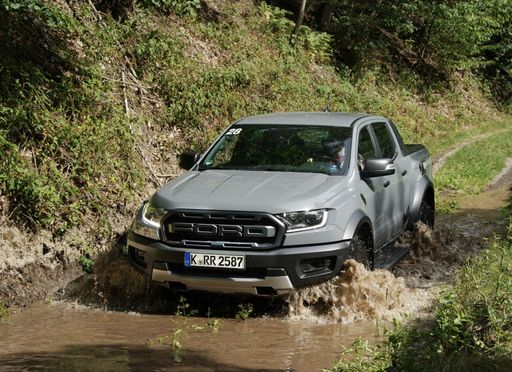 @ media.ford.com
@ media.ford.com
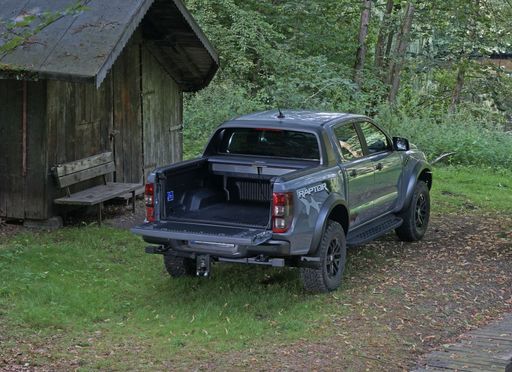 @ media.ford.com
@ media.ford.com
Lexus ES
The Lexus ES represents a blend of luxury and comfort, offering a smooth driving experience that is characteristic of the brand. With its elegant design and meticulously crafted interior, it provides a serene environment for both driver and passengers. The inclusion of advanced safety features and cutting-edge technology enhances its appeal, ensuring that every journey is not only enjoyable but also secure.
details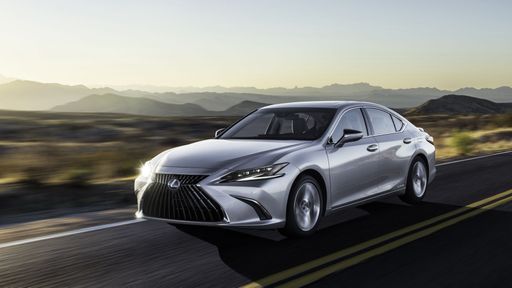 @ toyota-media.de
@ toyota-media.de
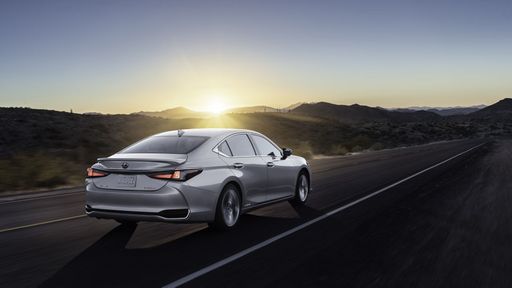 @ toyota-media.de
@ toyota-media.de
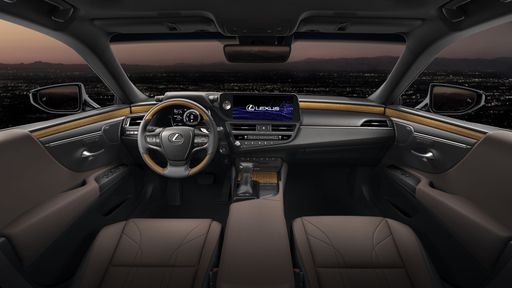 @ toyota-media.de
@ toyota-media.de

|

|
|
|
|
Costs and Consumption |
|
|---|---|
|
Price
34500 - 68800 £
|
Price
46600 - 59300 £
|
|
Consumption L/100km
3.1 - 13.8 L
|
Consumption L/100km
5.10 L
|
|
Consumption kWh/100km
-
|
Consumption kWh/100km
-
|
|
Electric Range
50 km
|
Electric Range
-
|
|
Battery Capacity
11.80 kWh
|
Battery Capacity
-
|
|
co2
70 - 315 g/km
|
co2
115 g/km
|
|
Fuel tank capacity
80 L
|
Fuel tank capacity
50 L
|
Dimensions and Body |
|
|---|---|
|
Body Type
Pickup
|
Body Type
Sedan
|
|
Seats
2 - 5
|
Seats
5
|
|
Doors
2 - 4
|
Doors
4
|
|
Curb weight
2082 - 2486 kg
|
Curb weight
1680 kg
|
|
Trunk capacity
-
|
Trunk capacity
454 L
|
|
Length
5370 - 5420 mm
|
Length
4975 mm
|
|
Width
1918 - 1968 mm
|
Width
1865 mm
|
|
Height
1868 - 1922 mm
|
Height
1445 mm
|
|
Payload
676 - 1108 kg
|
Payload
470 kg
|
Engine and Performance |
|
|---|---|
|
Engine Type
Diesel, Petrol, Plugin Hybrid
|
Engine Type
Full Hybrid
|
|
Transmission
Manuel, Automatic
|
Transmission
Automatic
|
|
Transmission Detail
Manual Gearbox, Automatic Gearbox
|
Transmission Detail
-
|
|
Drive Type
All-Wheel Drive
|
Drive Type
Front-Wheel Drive
|
|
Power HP
170 - 292 HP
|
Power HP
218 HP
|
|
Acceleration 0-100km/h
7.9 - 12.1 s
|
Acceleration 0-100km/h
8.90 s
|
|
Max Speed
180 - 190 km/h
|
Max Speed
180 km/h
|
|
Torque
405 - 697 Nm
|
Torque
-
|
|
Number of Cylinders
4 - 6
|
Number of Cylinders
4
|
|
Power kW
125 - 215 kW
|
Power kW
160 kW
|
|
Engine capacity
1996 - 2993 cm3
|
Engine capacity
2487 cm3
|
General |
|
|---|---|
|
Model Year
2022 - 2025
|
Model Year
2024
|
|
CO2 Efficiency Class
G, B
|
CO2 Efficiency Class
C
|
|
Brand
Ford
|
Brand
Lexus
|
Ford Ranger
A Comprehensive Look at the Ford Ranger: Versatility Meets Innovation
The Ford Ranger has long been a staple in the world of pick-up trucks, renowned for its robust design and versatility. Whether for rugged off-road adventures or everyday utility tasks, the Ford Ranger continues to be a frontrunner in the pick-up segment. In this article, we explore the technical details and innovative features that set the latest versions of the Ford Ranger apart from its competitors.
Powertrain Performance: A Range of Choices
The Ford Ranger offers a selection of powerful engines, catering to a diverse set of user requirements. Engine options range from the fuel-efficient 2.0-litre EcoBlue diesel engine to the robust 3.0-litre EcoBoost petrol engine, offering impressive outputs from 170 to 292 PS. These engines are paired with either a manual or an advanced automatic transmission, both providing smooth shifting and optimised performance across various driving conditions.
The Ranger’s all-wheel-drive system ensures a robust off-road capability while maintaining a composed ride on urban roads. With torque figures ranging between 405 Nm and 600 Nm, the Ranger guarantees ample pulling power whether you're on or off the beaten track.
Fuel Efficiency and Environmental Considerations
Recognising the importance of balancing performance with efficiency, the Ford Ranger delivers competitive fuel consumption figures ranging from 8.4 to 13.8 litres per 100 km. Despite its robust performance capabilities, the Ranger remains mindful of its environmental footprint, maintaining a functional balance between power and efficiency with a CO2 efficiency class of G.
Advanced Safety and Technology Features
Incorporating cutting-edge technology, the Ford Ranger is equipped with a suite of safety features designed to protect both passengers and payload. Among these are adaptive cruise control, lane-keeping assistance, and a pre-collision assist system, enhancing the driver's ability to navigate both rural roads and busy motorways safely and efficiently.
Moreover, the interior tech suite includes an intuitive infotainment system, complete with connectivity options for seamless integration of smartphones and smart devices. This ensures drivers and passengers can stay connected and entertained on all journeys.
Customisation and Comfort
The Ford Ranger offers a variety of trim levels, allowing customers to tailor the vehicle to their specific needs. From the rugged XL 4x4 to the luxurious Platinum e-4WD Automatik, there is a model to suit every preference and requirement. Equipment lines such as Wildtrak and MS-RT add enhanced styling and additional features for those seeking a more distinctive and upscale appearance.
Inside, the Ranger provides comfortable seating configurations for up to five passengers, with premium materials and ample storage space to ensure every journey is a pleasant experience. Users can also benefit from a range of comfort features, including climate control, premium audio systems, and adjustable seating.
Practicality Meets Payload
The Ford Ranger excels in practicality with its impressive payload capacity and spacious cargo bed, suitable for carrying everything from work equipment to recreational gear. With a maximum payload of up to 1,108 kg, the Ranger is more than capable of handling heavy loads, making it an ideal choice for both professional and personal use.
Additionally, the robust chassis and durable build quality provide long-lasting performance even under the most demanding conditions, ensuring reliability and endurance in the long term.
Conclusion: A Resilient Companion for All Terrains
With its capable engine choices, outstanding off-road capabilities, and a host of advanced features, the Ford Ranger continues to lead the way in the pick-up truck category. Whether for practical utility, adventurous pursuits, or simply as a reliable daily vehicle, the Ranger delivers on all fronts – a true testament to Ford’s commitment to innovation and quality in the automotive industry.
Lexus ES
Explore the Alluring Elegance of the Lexus ES
The Lexus ES continues to uphold its reputation as a beacon of luxury and innovation in the automotive world. Known for its graceful design and premium feel, the ES series offers an impressive blend of performance and efficiency. With a focus on technical prowess and sustainability, this model is a testament to Lexus's commitment to excellence.
Performance and Efficiency: A Seamless Blend
At the heart of the Lexus ES is its full-hybrid technology. The 218 PS powertrain, featuring a 4-cylinder engine, harmoniously integrates a combustion engine with an electric motor to provide a remarkable drive. The ES achieves its impressive power output of 160 kW while maintaining a commendable fuel consumption of 5.1 L/100 km. This balance between power and efficiency is manifested in its acceleration from 0 to 100 km/h in just 8.9 seconds, powering seamlessly through a cost-effective CVT-gearbox with front-wheel drive. Despite its athletic capabilities, the ES remains well within the bounds of responsible emissions with a CO2 output rated at 115 g/km.
Design and Comfort: A Statement of Luxury
The Lexus ES's exterior is crafted as a testament to sophistication. Its sleek silhouette measures 4975 mm in length, 1865 mm in width, and 1445 mm in height, with a striking aesthetics that demands attention. The interior offers spacious comfort with seating for five, highlighted by high-quality materials and meticulous attention to detail. Additionally, the boot space offers a generous 454 litres capacity, ensuring practicality is not compromised.
Technological Advancements and Features
Equipped with the latest in automotive technology, the Lexus ES features a suite of advanced driver-assistance systems for enhanced safety and convenience. From its responsive infotainment system to the intuitive controls, each feature has been designed with the driver in mind. For those seeking variety, the car is available in several trim levels including the Automatik, Business Edition Automatik, Executive Automatik, and Luxury Automatik, offering a tailored experience for every discerning driver.
Cost of Ownership
With prices ranging from €54,350 to €69,200, the Lexus ES provides a competitive edge in the luxury segment with its multitude of features. The running costs are also reasonable, with expense estimates ranging from €1,289 to €1,497 per month and a cost per kilometre between 51.6 and 59.9 cents. This cost efficiency makes it a feasible choice for those looking to balance luxury with practicality.
Conclusion: A Hybrid of Innovation and Style
The Lexus ES stands as a prime example of how hybrid technology can transform the driving experience, merging the thrill of performance with the benefits of fuel efficiency. With its state-of-the-art features and impeccable build, the ES is a remarkable vehicle for those who seek luxury and innovation on the road.
The prices and data displayed are estimates based on German list prices and may vary by country. This information is not legally binding.
